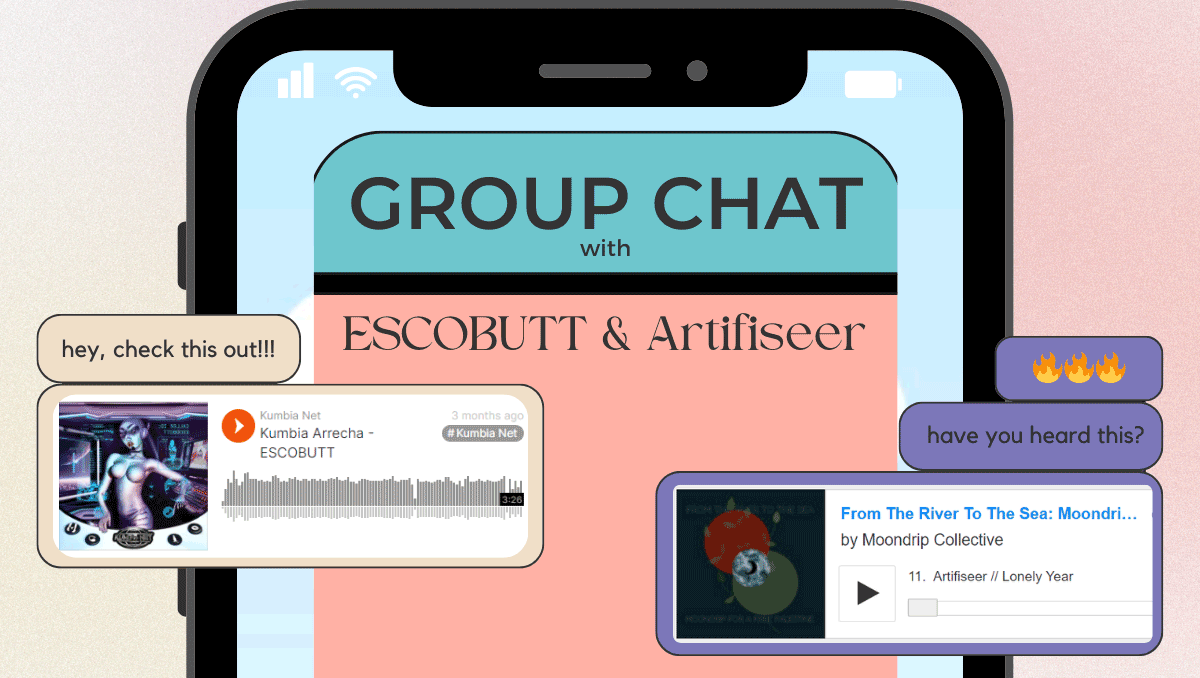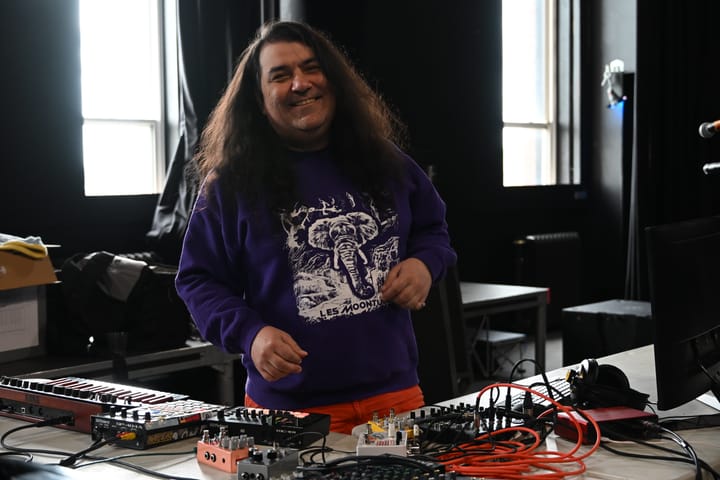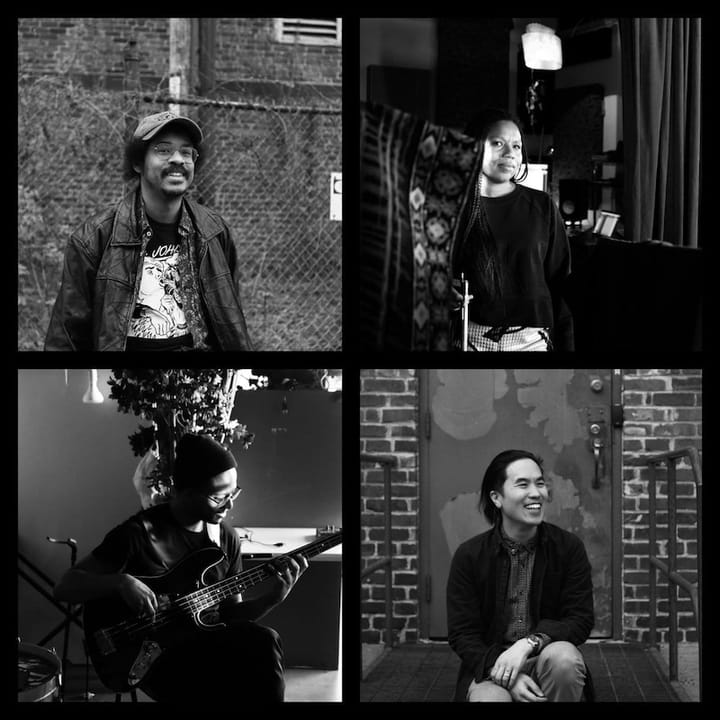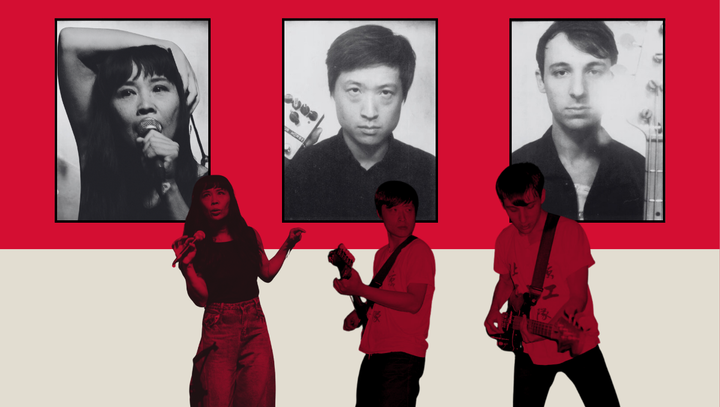
Group Chat: ESCOBUTT / Artifiseer
Welcome to New Feeling’s Group Chat. In this feature, we invited a panel of writers to give their takes on two songs selected by our editorial team, with the goal of offering a variety of perspectives on each track and discovering common threads of interest, analysis, and interpretation.
Alexia Bréard Anderson, Daniel G. Wilson, Sarah Chodos, and Tom Beedham get the conversation started with the cybersonic sounds of Toronto-by-way-of-Bogota artist ESCOBUTT's "Kumbia Arrecha" single. The conversation continues between Alexia Bréard Anderson, Daniel G. Wilson, Tom Beedham and Michael Rancic, who discuss Montreal-based "anxiety-wave" artist Artifiseer, whose “Lonely Year” appears on Moondrip Collective’s From the River to the Sea: Moondrip for A Free Palestine compilation.
ESCOBUTT - "Kumbia Arrecha"
Alexia Bréard Anderson: Sisisisi señor, si señor. Writing about ESCOBUTT’s first single almost doesn’t do them justice, as the track’s entire essence is a reverse-cowgirl of roles, an América Invertida of nü Latin-electronic music, or in the artist’s own words: un meme completo!
Tune in to a sweaty alien hotline among glitched-out moans and nostalgic dial pad tones, reminiscent of reggaeton viejo from the mid-2000s. As ESCOBUTT demands immediate payment, a dragging, trance-inducing cumbia shifts into the unmistakable, bass-heavy beats of funk ostentação.
A sensual, tongue-in-cheek ode to the underground realms of cyber-futurism if there ever was one — long live an impeccable mix, long live la puta.
Daniel G. Wilson: From its origins as a multi-ethnic form of Columbian funeral music and into a truly pan-American style, cumbia has evolved various offshoots, sub-genres, and fusions, with musicians of all stripes across Latin America such as Juaneco y Su Combo and Caifanes adding their spin to the genre. ESCOBUTT continues this evolution on “Kumbia Arrecha,” bringing the traditional style into the digital age. Synthetic sounds reminiscent of 90s illbient that evoke PlayStation 1 game soundtracks mix together with the classic rhythms and instrumental flourishes of traditional cumbia. Through these sounds, ESCOBUTT transports the listener into a cyberpunk world where a mechanized hotline operator guides a caller through various options, including language preferences, and requesting financial domination. This interplay between sex and technology goes a step further with a breakdown section that incorporates the sounds of funk carioca alongside glitched moans of pleasure.
Sarah Chodos: ESCOBUTT’s single, “Kumbia Arrecha” spoke to me because it is both apocalyptic and seemingly benign. Over electronic music we hear an erotic, futuristic phone directory, which manages to be mundane but also surreal — alluding to a common sentiment in late-stage capitalism.
The piece itself is laden with catchy hooks, and keeps sounding like it is about to speed up, though it never actually does. It is tension with no satisfaction, like the whole piece is on hold.
Thumps and bleeps round out the instrumentation, as do distorted vocals. The piece culminates in the spoken line “I am going to put you on hold for a second,” and then that is how it ends.
This could sound post-apocalyptic if it sounded like it was post-anything, but “limbo” is probably a better description. An apt sentiment for these times: living in the encroaching shadow of something we don’t understand.
Tom Beedham: Some x-rated pun lost in translation no doubt, “Kumbia Arrecha” (literally hot kumbia) lounges in the automated call answering system for an imaginary erotic service hotline like an atmospheric dark comedy response to Drake’s “Hotline Bling.” While the latter appropriated language around sex work to self-mythologize one man’s humble brag booty calls, ESCOBUTT’s track underlines the premise that sex work is work in red. Riding cumbia struts and vocal samples of suggestive moans and expressions processed like Neo entering a rabbit hole of latex-clad ravers and suits, ESCOBUTT’s track is part skit and part ambient club warmer, delivering an experience that’s explicitly sexier and stickier than the comparably sterile environments depicted in Drake’s music video, arriving at the intersection of a fully automated world without work and an anticapitalist wealth redistribution fantasy guarded by the liberated (un)availability of its own machinic deadpan “To register for financial domination, press 3.”
Artifiseer - "Lonely Year"
Alexia Bréard Anderson: Suspended in limbo, waves crash all around us in this latest experimental track by Saint John-born, Montréal-based Artifiseer. Harmonized hums begin to reveal themselves, soothing the blow and slowly guiding us back to the surface. Risers and downtempo steel drums craft a steady trip-hop beat, as airs of melancholy weave into a hesitant optimism, a glimmer of possibility, a slow unfolding of what could be.
Listen carefully, and the infinite voices chattering inside your head may just become a choir, whispering their way through windy basslines and electronic thunderclaps right into the eye of the storm.
A moment of stillness, a centering, a portal to the other side.
Daniel G. Wilson: Grinding beats that evoke the drunken swing of J. Dilla's iconic productions blend together with post-industrial timbres and harmonic textures while a mechanized voice screams a refrain of “nothing” in the background to create a visceral soundscape akin to a beautiful nightmare. Filtered through a heavy glitch-pop and noise-filled lens, Artifiseer keeps the listener in a state of constant unease, never fully allowing them a chance to wake up from the experience until the end.
Tom Beedham: Speak-singing through a fog of vocal processing, Ian Livingstone’s words take on a robotic character throughout this downcast, mournful expression, though it’s often difficult to make out more than a word or a phrase from the signal distortion and clouds of corrupting noise haunting the track. What remains is a voice struggling to be heard, and while it’s discernable enough that things are looking pretty bleak for the source of these not fully identifiable sentiments, even when a declared “nothing, nothing” can be heard over the noise, its defiant persistence gives off the impression of an inextinguishable gathering of strength.
Michael Rancic: The song quickly finds an almost hypnotic groove between its skittering beat, meandering keys, stabs of static, and vocoder vocal effect. The static asserts itself more and more, pulling focus away from the compelling rhythms, like waves of anxiety coming to the fore. As they follow the melodic progression, the vocals sound isolated and alien, adding a strong sense of melancholy to the building sense of unease. Still, it’s hard to not be drawn in by it all– the intrusion of the static becomes familiar, the repetition of the melody only embeds it further into your brain, and the sense of overwhelm subsides, leaving behind the strong desire to hear it all over again.
Read more

Step Into Little Stone Crow's World

“The process is the project” : Egyptian Cotton Arkestra stays rooted in Time and Place

